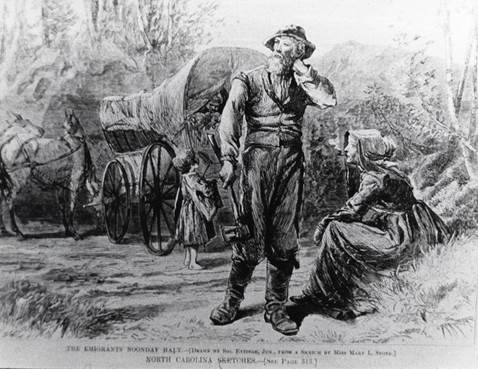| This Week’s Topic… | |

Best viewed in
|
Hillbillies, Rednecks and Crackers
Many words commonly used in America today have their origins in Celtic roots. While the following three terms are associated today with the American South and southern culture, their origins are distinctly Scottish and Ulster-Scottish (Scots-Irish), and date to the mass immigration of Scottish Lowland and Ulster Presbyterians to America during the 1700’s. HILLBILLY
Supporters of King William were known as “Orangemen” and "Billy Boys" and their North American counterparts were soon referred to as "hill-billies". It is interesting to note that a traditional song of the Glasgow Rangers football club today begins with the line, "Hurrah! Hurrah! We are the Billy Boys!" and shares its tune with the famous American Civil War song, "Marching Through Georgia". There are many reports of Southern National Guard units being serenaded with this tune, much to their chagrin, upon arriving in the British Isles during the First and Second World Wars, as the tune is very popular with British and Commonwealth military bands.
REDNECK
Since many Ulster-Scottish settlers in America (especially the South) were Presbyterian, the term was applied to them, and then, later, their Southern descendants. One of the earliest examples of its use comes from 1830, when an author noted that "red-neck" was a "name bestowed upon the Presbyterians." Another term for Presbyterians in Ireland was a "Blackmouth". Members of the Church of Ireland (Anglicans) used this as a slur, referring to the fact that one could tell a Presbyterian by the black stains around his mouth from eating blackberries while at secret, illegal Presbyterian Church Services in the countryside.
CRACKER
And while not an exclusively Southern term, but rather referring in general to all Americans, the origins of this word are related to the other three… GRINGOOften used in Latin America to refer to people from the United States, “gringo” also has a Scottish connection. The term originates from the Mexican War (1846-1848), when American Soldiers would sing Robert Burns’s “Green Grow the Rashes, O!”, or the very popular song “Green Grows the Laurel” (or lilacs) while serving in Mexico, thus inspiring the locals to refer to the Yankees as “gringos”, or “green-grows”. The song “Green Grows the Laurel” refers to several periods in Scottish and Ulster-Scottish history; Jacobites might “change the green laurel for the “bonnets so blue” of the exiled Stewart monarchs of Scotland during the Jacobite Rebellions of the late 1600’s – early 1700’s. Scottish Lowlanders and Ulster Presbyterians would change the green laurel of James II in 1690 for the “Orange and Blue” of William of Orange, and later on, many of these Ulstermen would immigrate to America, and thus “change the green laurel for the red, white and blue.” |
